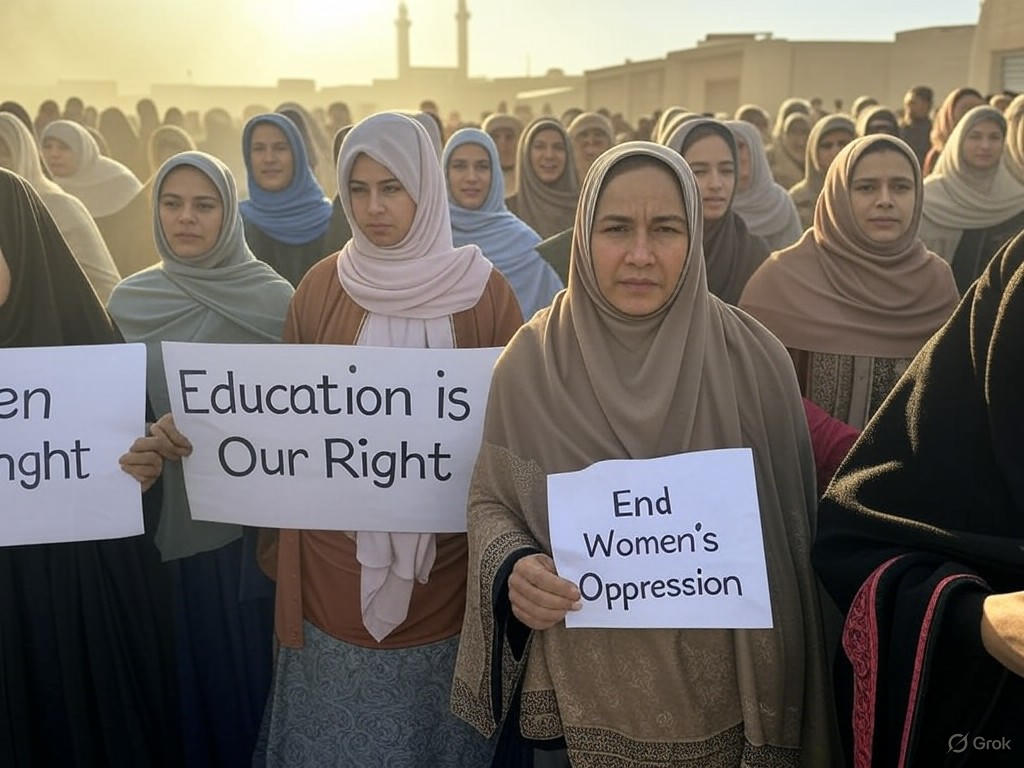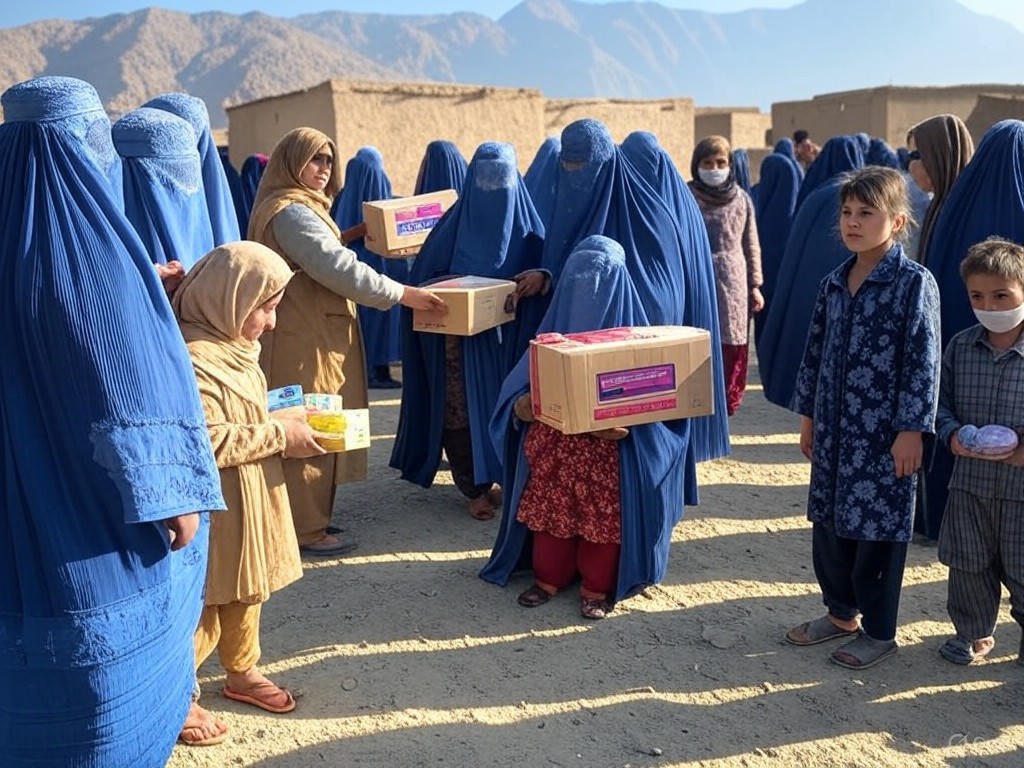Taliban’s Afghanistan: Women’s Rights Under Siege
In the rugged valleys and bustling streets of Afghanistan, where ancient traditions once intertwined with the hopes of a new era, a shadow has fallen over the lives of millions. Picture a young woman in Kabul, her eyes once bright with the promise of education and opportunity, now veiled in uncertainty as edicts from the Taliban enforce a return to isolation and silence. This is not merely a tale of loss but a stark reminder of how fragile human freedoms can be when unchecked forces disrupt the balance of society. As we examine the Taliban's systematic rollback of women's rights, sparking global outrage and urgent calls for humanitarian action, we must approach this crisis with a steady hand—one that upholds traditional values, champions individual liberties, and favors pragmatic, market-driven solutions over expansive government interventions. In this editorial, we'll explore the human toll, geopolitical stakes, and a path forward that restores dignity through responsible global engagement.
The Rollback Under Taliban Rule
The Taliban's resurgence in Afghanistan since August 2021 has ushered in a series of decrees that have dismantled decades of progress on women's rights, reducing women to the margins of public life. Under their strict interpretation of Islamic law, girls above the sixth grade have been barred from schools, women prohibited from working in most sectors, and even basic freedoms like traveling without a male guardian curtailed Human Rights Watch. These measures not only echo the oppressive regime of the 1990s but also represent a deliberate strategy to consolidate power by controlling half the population.
This rollback is not isolated; it permeates every facet of daily life. Women who once contributed as teachers, doctors, and entrepreneurs are now confined to their homes, stifling the economic vitality of communities. According to a report from the United Nations Assistance Mission in Afghanistan, female participation in the workforce has plummeted by over 80% since the Taliban's takeover, exacerbating poverty and dependency UNAMA. Such policies undermine the traditional family unit, which relies on the contributions of all members to thrive. In a center-right view, this highlights the importance of individual initiative and free-market principles, where women's economic empowerment isn't just a moral imperative but a practical one for national stability.
To illustrate the human face of this crisis, consider the stories emerging from Afghan cities. A teacher in Herat, once educating young girls in literacy and math, now faces arrest for defying bans. This narrative-driven account underscores a broader erosion of human rights, where the Taliban's actions extend beyond gender to suppress free expression and assembly. Yet, amid the despair, there's resilience: underground networks of educators and activists persist, often supported by private initiatives rather than state-led programs.  Afghan women gather in a defiant rally against Taliban restrictions, showcasing the quiet strength and determination that could fuel grassroots recovery efforts.
Afghan women gather in a defiant rally against Taliban restrictions, showcasing the quiet strength and determination that could fuel grassroots recovery efforts.
Geopolitical Implications and Global Outrage
The Taliban's policies have ignited widespread condemnation, positioning Afghanistan as a flashpoint in global geopolitics. Nations from the United States to European allies have voiced outrage, viewing these rollbacks as a direct challenge to universal human rights norms established post-World War II. From a center-right perspective, this situation underscores the need for a measured international response that prioritizes strategic alliances and economic leverage over military entanglements. As The Wall Street Journal reports, the Taliban's isolation has already led to sanctions and aid suspensions, which could pressure the regime without escalating into costly interventions.
Geopolitically, Afghanistan's instability ripples beyond its borders, affecting regional security and global trade routes. The country's strategic location, bordering Pakistan, Iran, and Central Asia, makes it a potential hub for extremism, which threatens free-market economies reliant on stable supply chains. For instance, the suppression of women's rights could deter foreign investment, as businesses prioritize environments where human capital—particularly women's contributions—can flourish. A study by the World Bank highlights how gender equality correlates with economic growth, noting that Afghanistan's GDP could rise by 30% with greater female participation World Bank. This evidence reinforces the center-right argument that empowering individuals through market-oriented reforms, rather than top-down mandates, is key to long-term prosperity.
However, the global response must be balanced. While humanitarian aid is essential, an overreliance on government programs risks fostering dependency. Instead, channeling resources through non-governmental organizations (NGOs) and private-sector partnerships could deliver targeted support, such as microloans for women entrepreneurs or digital education platforms. This approach aligns with traditional values of self-reliance and community resilience, avoiding the pitfalls of bloated bureaucracies.  Volunteers distribute essential supplies in a rural Afghan village, demonstrating how private humanitarian initiatives can bridge gaps left by governmental shortcomings.
Volunteers distribute essential supplies in a rural Afghan village, demonstrating how private humanitarian initiatives can bridge gaps left by governmental shortcomings.
Evidence of the Human Toll and Calls for Action
Empirical evidence paints a grim picture of the consequences. According to data from Amnesty International, over 70% of Afghan women report experiencing severe mental health issues due to restrictions, with suicide rates soaring in provinces like Bamiyan Amnesty International. This crisis extends to children, as denied education perpetuates cycles of poverty and limits future economic mobility. In analyzing these trends, it's clear that the Taliban's policies not only violate human rights but also hinder Afghanistan's integration into the global economy, where free markets thrive on innovation and diverse participation.
Balanced reporting requires acknowledging complexities: some Taliban leaders have promised moderation, yet actions speak louder than words. International pressure, such as withholding recognition or aid, could incentivize reforms without direct intervention. For example, the U.S. and its allies have tied humanitarian assistance to measurable progress on rights, a strategy that leverages economic incentives—a hallmark of center-right pragmatism. As Reuters notes, this approach has already prompted limited concessions, like partial allowances for female health workers, proving that targeted diplomacy can yield results.
A Forward-Looking Path: Optimism Through Principle
In concluding, the Taliban's rollback of women's rights in Afghanistan is a profound challenge that demands a response rooted in optimism and enduring values. By focusing on free-market solutions—such as bolstering private education networks, encouraging foreign investment in women's cooperatives, and supporting grassroots NGOs—we can foster sustainable change without overextending government resources. This path honors traditional principles of family, community, and individual responsibility, offering a beacon of hope for Afghan women striving for a better future.
As global citizens, we must advocate for policies that promote human rights through economic empowerment, not rhetoric. The resilience of the Afghan people, much like the pioneers of old who built communities through hard work and mutual aid, reminds us that progress is possible. Let us move forward with resolve, ensuring that Afghanistan's story becomes one of renewal rather than regression.

